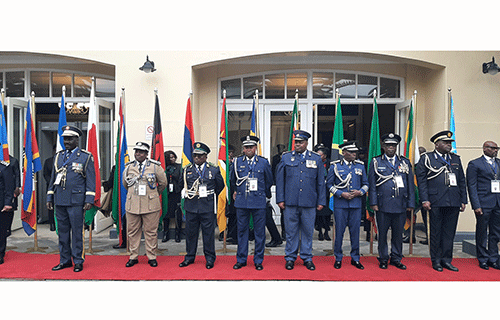SWAKOPMUND – Safety and security minister Albert Kawana has urged SADC police chiefs to redirect efforts in determining challenges affecting deployed personnel on the ground to ensure proper planning.
Kawana was speaking at the 28th annual general meeting of the Southern African Development Community (SADC) chiefs of police sub-committee that concluded on Friday in Swakopmund.
He said the increase of terrorism within the region is one of the areas that require more responsiveness, with terrorist groups committing atrocities against innocent civilians in some member states, such as Mozambique.
“You should always remember that you are a critical component of our region’s peace and security architecture. The SADC mission in Mozambique is one such peace support operation where we need to ensure all the pledged capabilities (human and material) are deployed to achieve set objectives,” said Kawana.
On his part, acting director of the Organ on Politics, Defence and Security Affairs Kealeboga Moruti said the SADC integrated strategy and action plan to prevent and combat Transnational Organised Crime (TOC) underscores the need for the region to adopt a multidisciplinary and sectoral approach on all levels to effectively combat transnational organised crime in the region.
According to Moruti, no country in the world has been able to demonstrate it can effectively combat transnational organised crime on its own; therefore, SADC member states must double efforts to effectively implement the SADC Protocols on Mutual Legal Assistance on criminal matters and extradition as well as actively participating in SARPCCO joint and simultaneous operations.
“It is, therefore, sad to note that as a region, one of our undoing when it comes to combating transnational organised crime is lack of cooperation and coordination amongst member states and different law enforcement agencies. Our response to transnational organised crime is fragmented as evidenced by limited interagency collaboration at national and intergovernmental levels. We are operating in silos,” she said.
Moruti also pointed out that there has been an increase in issues of illicit small arms, light weapons and explosives as major enablers of TOC.
Hence, she urged member states to effectively implement the SADC Protocol on the Control of Firearms, Ammunition and Other Related Materials.
However, she voiced concern over the limited number of states that have ratified the agreement amending the protocol, emphasising that at least eight member states are required for the amended protocol to come into effect.
Despite these challenges, Moruti praised the progress made by the SADC Mission in Mozambique in restoring peace and stability in the province of Cabo Delgado.


